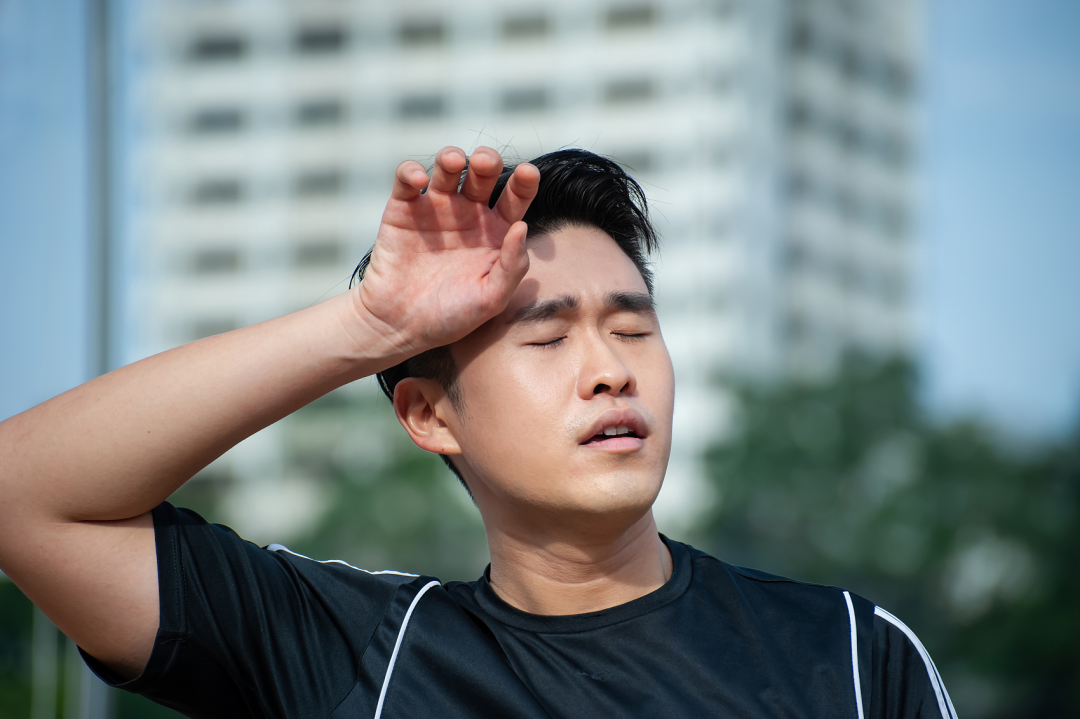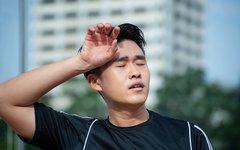Five Major Characteristics of Qi Deficiency Constitution Are You Affected?“
Qi deficiency constitution is a common issue that many people encounter, but many may not realize they are affected. This article will reveal the five major characteristics of qi deficiency constitution, helping you better understand and improve your physical condition.
”
Individuals with a qi deficiency constitution often exhibit some abnormal symptoms in daily life. Let us take a closer look at these five major characteristics.
Excessive Sweating, Sweating at the Slightest Movement
Excessive sweating, sweating at the slightest movement

People with a qi deficiency constitution tend to sweat easily, and some may even experience spontaneous sweating, meaning they sweat without any physical activity. Moreover, the temperature of the sweat is not high; unlike normal sweating due to heat, qi deficient individuals may even experience cold sweats.
Normal sweating occurs when one is too hot, causing the pores to open and sweat to be released, taking away some heat and providing a cooling effect, which is a form of self-regulation.
However, for those with qi deficiency, sweating is not the same. The body is not hot, yet the pores open, leading to the loss of body fluids, resulting in a lack of warmth in the vital energy, making one feel cold rather than cool. Why do the pores open on their own? This is due to the weakness of the wei qi (defensive qi).
1. What is Wei Qi?
As the name suggests, it is responsible for protecting and defending the body. According to TCM theory, wei qi exists between the skin and has three main functions: first, it protects the surface of the body and defends against external pathogens; second, it nourishes the organs, muscles, and skin; third, it regulates the opening and closing of the pores and the excretion of sweat, maintaining a constant body temperature.
If wei qi is too weak, it is like soldiers guarding a city gate who are not strong enough to control the situation well. Therefore, they cannot defend against external pathogens and cannot regulate the loss of body fluids, failing to provide adequate nourishment to the organs, muscles, and skin. They are like derelict guards, so when external pathogens invade, one easily catches a cold. Since wei qi itself has a cold nature, when it is harmed by external pathogens, it stops flowing and accumulates on the surface of the body, causing one to feel cold on the surface, resulting in cold sweats even when sweating, making the body feel colder.
Thus, individuals with a qi deficiency constitution are prone to catching colds, and this is the reason.
Shortness of Breath, Reluctance to SpeakShortness of Breath, Reluctance to Speak
People with qi deficiency are particularly prone to fatigue; in severe cases, they may need to catch their breath after speaking a few words, and their voices are often very soft, making it hard for others to hear. In reality, speaking is also very laborious for them, as evidenced by their labored breathing. The most troubling part is that even if they do not want to speak or show signs of breathlessness, during summer, when the weather gets hot, they may feel anxious and short of breath, struggling to catch their breath when climbing stairs, resembling an asthma attack, which can be quite alarming.
1. Why do some people experience shortness of breath and wheezing?
It is because their heart and lung functions are somewhat weakened, leading to lung qi deficiency.
According to modern medical theories, the lungs are the organs responsible for gas exchange. The greater the lung capacity, the stronger the respiratory system, making it easier to provide sufficient oxygen to the body, thus enhancing overall health; conversely, insufficient lung capacity is not a good sign. Although the “lung” in TCM does not equate to the modern medical understanding of the lungs, there are some similarities. Therefore, TCM practitioners often suggest that individuals with qi deficiency should practice deep breathing exercises in a fresh air environment upon waking to increase lung capacity.
Easy Fatigue, Lack of Interest in Activities
Compared to men, women are naturally more prone to being quiet. This tendency can be attributed not only to cultural and traditional habits but also to certain physiological factors.
Experience shows that qi deficiency constitution has certain demographic characteristics. The elderly and children are more prone to qi deficiency, while adults are less so; women are more prone to qi deficiency, while men are relatively less so. Women tend to be quieter and more inclined to settle down because they are more likely to experience qi deficiency, which is why advertisements often encourage women to tonify qi and blood—because they are more susceptible to qi deficiency and blood deficiency, thus needing supplementation.
One characteristic of individuals with a qi deficiency constitution is that they are easily fatigued and lack the energy to engage in activities, which forces them to be quiet. This is somewhat similar to those with a yang deficiency constitution.
1. What is Qi Deficiency?
This is also easy to understand; “qi deficiency” refers to insufficient vital energy.
1. What is Vital Energy?
In TCM theory, vital energy is the foundation of life, determining all aspects of life. The yin qi and yang qi commonly referred to fall under the category of vital energy. When vital energy is abundant, a person’s immunity is strong, and the body is healthy; conversely, when vital energy is insufficient or damaged, the body cannot produce enough antibodies or immunity to combat diseases, leading to a depletion of vital energy and ultimately death. Therefore, vital energy is the fundamental basis of life activities and the guarantee of existence.
Individuals with qi deficiency have insufficient vital energy and energy, which cannot meet the needs of life activities. The body instinctively allocates energy to the most essential areas, such as basic survival needs like eating, drinking, and sleeping, while conserving energy for less critical activities like speaking and exercising, resulting in the characteristic of qi deficient individuals being more inclined to remain still, thus creating a large number of quiet and gentle women.
Thin or Weak Body Type
With insufficient vital energy, life vitality is weak, and the functions of qi in promoting, warming, defending, consolidating, and transforming are diminished.
For example, some individuals with qi deficiency have poor digestive function, so after eating, they often feel a sense of fullness in the upper abdomen and rarely feel hungry, leading to poor appetite and an inability to gain weight. Originally qi deficient and weak, the lack of timely energy replenishment due to poor appetite further weakens the body, resulting in a thin physique.
On the other hand, some individuals with kidney qi deficiency have weak qi transformation functions, leading to metabolic disorders of body fluids. When body fluids are not transformed, energy circulation within the body becomes obstructed, resulting in poor blood circulation, phlegm accumulation, and water retention, leading to edema and a condition known as “false obesity.” Therefore, individuals with this constitution may easily feel cold in their hands and feet when exposed to cold or wind, and they may also experience significant swelling, feeling weak and breathless after walking a few steps. This explains why some overweight individuals, who should have abundant energy and a robust physique, are actually very weak, a condition often referred to as “false obesity.”
In contrast, healthy individuals with abundant vital energy appear robust. However, some individuals, regardless of their weight, always seem somewhat lacking in vitality, appearing weak. For instance, they may have pale complexion, pale lips, or a sallow complexion. Upon closer examination, they may exhibit a swollen tongue with teeth marks, and when checking their pulse, it may be difficult to detect any movement. In fact, they often feel fatigued, have low spirits, and may also show signs of irregular bowel movements and decreased libido. Such individuals often have weak organs, with certain functional activities diminished or declining, leading to decreased resistance to disease—although they may not be ill, they are qi deficient.
Other Symptoms
In addition to the above characteristics, individuals with a qi deficiency constitution may also experience other symptoms, such as cravings for sweets after fatigue, lack of elasticity and luster in the skin, loose teeth, restlessness, palpitations, dizziness, and signs of internal heat. Although these symptoms are not severe, they reflect an internal imbalance in the body, necessitating appropriate qi tonification for improvement.



Individuals with a qi deficiency constitution are prone to symptoms such as sweating, shortness of breath, lack of energy, and a thin or false obese body type in daily life. To improve these conditions, it is necessary to tonify qi to enhance vitality and immunity. It is recommended that everyone pay attention to their physical condition, engage in appropriate exercise, and adjust their dietary structure to alleviate the discomfort caused by qi deficiency constitution.
 END
END
Dietary Guidance, Your Expert in Dietary Advice!
Follow Dietary Guidance for a Healthy and Beautiful Life!

